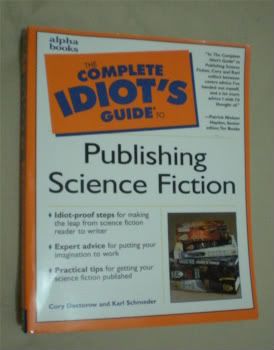I'm not sure if this is a reaction to Star Trek, or a reaction to Tolkienesque fantasy, or something else entirely, but I like it when the aliens in my SF actually feel alien. I'm not just talking about them looking alien (although obviously that helps). I'm talking about alien psychology. It seems to me that so much of the way we think is influenced by our environment that I find it hard to believe that we'd have no trouble understanding a species evolved somewhere completely different.
Also, I'm not a fan of universal translators. At least, universal translators that work flawlessly. Everyone has played with Babelfish or some other online translator; you all know how bad they are, and that's on a single planet, amongst a single species. I don't know much about linguistics, but I do know that language is heavily influenced by culture, psychology, environment, and probably a dozen other things I haven't thought about. How the heck would you go about automatically translating something where none of those baselines were shared?
I suppose there are stories that this kind of thinking closes off for me. Assuming that alien-aliens is a hard and fast rule, of course (and I make no promises there!). No galactic clubs, where groups of aliens hang out and share knowledge and generally pal around. No Babylon 5. And maybe that's a pity.
Of course, it does provide opportunities. They can be excellent things for your characters to throw themselves against. How would we, as a species, respond to an alien race that we couldn't possibly communicate with? How would you respond to it? Unfathomable aliens can also make space feel really sinister -- they're out there, but what are they thinking? And would we like it if we knew?
Let me see if I can provide you with some examples where I've really enjoyed the aliens. There's "Story of Your Life" by Ted Chiang, which is all about alien psychology. "From Babel's Fallen Glory We Fled" has a good automatic translator in it. The aliens in Alastair Reynolds' Revelation Space books are pretty darned alien. I suppose there's classics like Arthur C. Clarke's Rendezvous with Rama, too.
Aaaaand that's probably enough reading for now!
Edit: it occurs to me on re-reading this post that it is basically just a long-winded way of saying that I like hard SF. Who knew?!
Also, I'm not a fan of universal translators. At least, universal translators that work flawlessly. Everyone has played with Babelfish or some other online translator; you all know how bad they are, and that's on a single planet, amongst a single species. I don't know much about linguistics, but I do know that language is heavily influenced by culture, psychology, environment, and probably a dozen other things I haven't thought about. How the heck would you go about automatically translating something where none of those baselines were shared?
I suppose there are stories that this kind of thinking closes off for me. Assuming that alien-aliens is a hard and fast rule, of course (and I make no promises there!). No galactic clubs, where groups of aliens hang out and share knowledge and generally pal around. No Babylon 5. And maybe that's a pity.
Of course, it does provide opportunities. They can be excellent things for your characters to throw themselves against. How would we, as a species, respond to an alien race that we couldn't possibly communicate with? How would you respond to it? Unfathomable aliens can also make space feel really sinister -- they're out there, but what are they thinking? And would we like it if we knew?
Let me see if I can provide you with some examples where I've really enjoyed the aliens. There's "Story of Your Life" by Ted Chiang, which is all about alien psychology. "From Babel's Fallen Glory We Fled" has a good automatic translator in it. The aliens in Alastair Reynolds' Revelation Space books are pretty darned alien. I suppose there's classics like Arthur C. Clarke's Rendezvous with Rama, too.
Aaaaand that's probably enough reading for now!
Edit: it occurs to me on re-reading this post that it is basically just a long-winded way of saying that I like hard SF. Who knew?!
